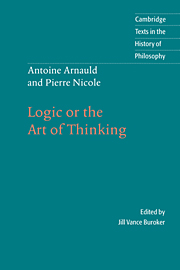Book contents
- Frontmatter
- Contents
- Acknowledgments
- Introduction
- Chronology
- Further reading
- List of works cited in the text and notes
- Note on the text and translation
- Logic or the Art of Thinking
- Preface
- Foreword
- First discourse
- Second discourse
- First part, containing reflections on ideas
- Second part of the Logic, containing reflections people have made about their judgments
- Third part of the Logic, on reasoning
- Fourth part of the Logic, on method
- Index
- Cambridge texts in the history of philosophy
Third part of the Logic, on reasoning
Published online by Cambridge University Press: 05 June 2012
- Frontmatter
- Contents
- Acknowledgments
- Introduction
- Chronology
- Further reading
- List of works cited in the text and notes
- Note on the text and translation
- Logic or the Art of Thinking
- Preface
- Foreword
- First discourse
- Second discourse
- First part, containing reflections on ideas
- Second part of the Logic, containing reflections people have made about their judgments
- Third part of the Logic, on reasoning
- Fourth part of the Logic, on method
- Index
- Cambridge texts in the history of philosophy
Summary
The part we now have to discuss, which includes the rules of reasoning, is considered the most important part of logic, and is almost the only one treated with some care. But there is reason to doubt whether it is as useful as is generally supposed. The majority of people's errors, as we have already said elsewhere, depend more on reasoning based on false principles, than from reasoning incorrectly from their principles. We rarely allow ourselves to be misled by arguments that are defective [178] merely because the conclusion is badly drawn. And those who could not recognize a fallacy by the light of reason alone would usually not be able to understand the rules behind it, much less to apply them. Nevertheless, when these rules are viewed merely as speculative truths, they are always useful for exercising the mind. Further, we cannot deny that they have some use now and then, with respect to some persons who, although naturally quick and discerning, still let themselves be misled occasionally by fallacious inferences only because of lack of attention, which could be remedied if they reflected on these rules. Be that as it may, here is what is usually said about them, and even a bit more than is usually said.
- Type
- Chapter
- Information
- Antoine Arnauld and Pierre Nicole: Logic or the Art of Thinking , pp. 135 - 226Publisher: Cambridge University PressPrint publication year: 1996



